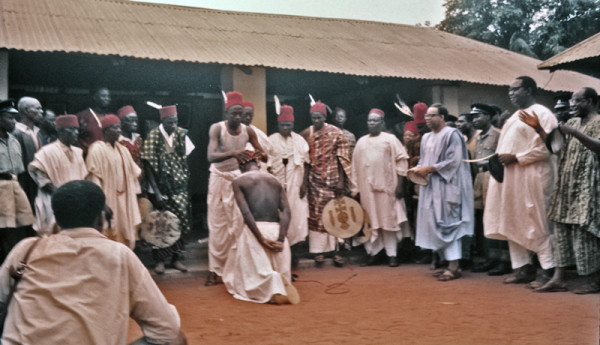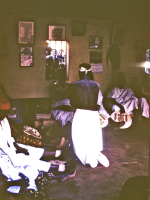1. Rituals performed in Onowu’s compound
[Note: Click on any image you may want to enlarge.]
The Prime Minister’s courtyard is defined by four nearly contiguous buildings, each with a corrugated-iron gabled roof. Entering through a gap between buildings, one walks into a wide dirt courtyard. At the opposite end the Throne Room (iru- ukpo, lit. “throne face”) presents a cool, dark open space facing the courtyard, with a substantial central pillar at the mouth of the room marking the back of its altar. The mud bench throne running along its back wall is now occupied by the four Senior Chiefs now supporting Igwe Enwezor (the Onowu, the Odu, the Onya, and the Owelle), and flanking them along the left and right walls of the room respectively sit four ranking chiefs (the Osuma, Adazie, Odua, and Akpe) and three lesser chiefs (the Akwue, Eseagba, and Asagwali). A short distance out in the dirt courtyard from the pillar a microphone has been placed on a stand (for the Nigerian Broadcasting Company, NBC, is here), and beside it a wooden chair has been reserved for the Obi-elect.
The other three buildings demarcating the courtyard have verandahs of varying size on which people could sit, and wooden folding chairs have been placed along one flank to provide seats for the elite. A dozen policemen stand guarding the entryways, and by the time Enwezor arrives some 350 people occupy all these spaces, many sitting in the dirt of the courtyard itself. The Archdeacon Nwosu, a notable Churchman from Igboland, is given a chair of honor near the one reserved for the Igwe (at right, below), and a pair of European officials and their wives sit in chairs provided on the opposite side of the courtyard beside some very stylishly dressed members of the local elite and various titled elders from Umu-EzeAroli. Untitled men watch from the verandahs, while most of the young people either stand near the entryways or sit in the courtyard dirt.
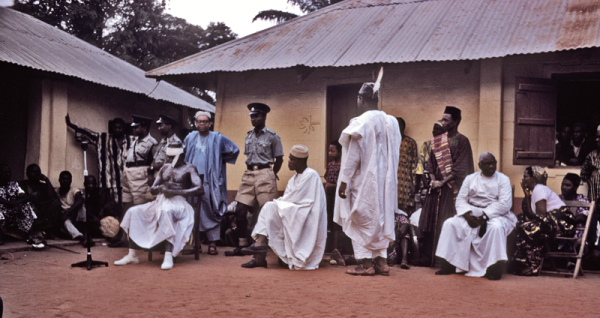 Enwezor, whom Barrister Emejulu leads into the arena through the doorway from the Onowu‘s own private quarters, wears white shoes and a white skirt, and his bare chest and upper arms are smeared with white clay. Round his head a band of white cloth has been tied, with an eagle feather tucked under each side, its barbs pointing toward the ground. As Barrister Emejulu leadsd him to his seat (where Enwezor now sits audibly cracking his knuckles), I switch on my tape recorder, thus obtaining the following verbatim account.
Enwezor, whom Barrister Emejulu leads into the arena through the doorway from the Onowu‘s own private quarters, wears white shoes and a white skirt, and his bare chest and upper arms are smeared with white clay. Round his head a band of white cloth has been tied, with an eagle feather tucked under each side, its barbs pointing toward the ground. As Barrister Emejulu leadsd him to his seat (where Enwezor now sits audibly cracking his knuckles), I switch on my tape recorder, thus obtaining the following verbatim account.
(The chief’s bell rings twice. The Prime Minister steps to the front of the Throne Room. He turns first to his chiefs, who remain seated at this time.)
Onowu: Odu! (Odu: onuiyi!); Onya! (Onya: ditto); Owele! (ditto) Odua! (ditto); Osuma! (ditto); Adazie Ogulani! (ditto); Odua! (ditto); Akpe! (ditto); Eseagba! (ditto); Asagwali! (ditto).
Onitsha, welcome! (nno kwanu o)
Audience: Yes! (E-e-e-h!)
Onowu: People of our place (ndi be anyi), welcome!
Audience: Yes!
(These initial salutations take the strongly traditional form of interjecting the formal title of each attending chief, in order of seniority, and awaiting that chief’s responsive salute, then concluding with two very sweeping inclusions of very broad categories of people — Onitsha people, people of Onitsha Town. This has the effect of both drawing all town residents into the current enterprise and labelling the chiefs as the primary active participants in that enterprise.)
(In what follows I render speech mainly in English, indicating Igbo words and phrases mainly where they seem important.)
Onowu: E h h m, the first thing, before I begin to break the kola, for there is kola here which we shall use to offer prayer to God (olisa ebulu uwa), who sets things right when they go wrong, the thing I want to tell every single person here: the position (onodu ife) I now occupy is by my rightful accession (olulu ka olulum), I did not seize it (agba burom nya agbabu). This is the Onowu; I am Iyasele of Onitsha town where we are today. Anyone disputing it is wasting time. (Onye na agbagbu ya na agbaghu ya na nkiti nabo). The flying termite eventually falls (prey) to the toad.
(In this opening presentation, the Prime Minister first sets the context within the framework of Great God jurisdiction, then justifies his current social role by grounding his identity in ascriptive prerogatives. This is followed by an allusion to an unnamed usurper who is “wasting time” which amounts to a denial of others’ rights to contest an issue and a proverb in which the Onowu identifies himself with the sitting predator, who awaits the inevitable decline of a prey soaring briefly above. Presumably the latter represents the Royal Clan Conference opposition or some member of it.)
Onicha-Eze-Chima, all in Onitsha both high and low (uphill and downhill), said that Oke-BuNabo have a King (i.e., James Okosi), that it is now for Umu-EzeAroli, come, Onitsha, was it what you said?
Audience: Yes!
Onowu: So we called Umu-EzeAroli and told them to select (ruputalu) for us a King who will be their King. So that any one who goes out, all tomorrows, he may say what is a precedent (eme obulu).
Umu-EzeAroli then went and selected who will be their King; even if he is the only ghost (mmuo) in Umu-EzeAroli, come, Umu-EzeAroli, didn’t you select him?
Audience: We selected him!
(In this striking passage, the Prime minister proposes that the personal qualifications of a candidate are irrelevant, provided he is selected by the appropriate section of the Royal Clan. The allusion to a “ghost” is in this context derogatory, suggesting someone who is not fully participant in this world.)
Onowu: So he was brought to be shown to the chiefs, the chiefs said he is good. Then after all there were other people who came out, and said that they are Umu-EzeChima, but you know that Umu-EzeAroli are also Umu-EzeChima. The person who is the one and only (buukwa) Umu-EzeChima today is Anthony Agunyego who is the son of Oreze at Obikporo over there. Anthony Agunyego, stand up, let me see you. (Agunyego, who you see in the photo above seated directly behind Igwe Enwezor, stands up.) Oreze then said, as Headman (onye isi) of Umu-EzeChima, that he stands where Umu-EzeAroli are.
(This suggests that the arousal of an opposition to Enwezor’s candidacy was tardy, occurring only after his presentation to the chiefs, and that the assertion of “Royal Clan” status by the Conference group lacked the validation of its most senior priest, the representative of Oreze, who ishowever an untitled man.)
(Some noise breaks out; bell rings.)
Onowu: Please, put ears to the ground, so that anyone getting home can tell what Onowu said. So it was, as you can see, that the matter was brought to us, the chiefs, we agreed (ekwe). Afterwards, there were people who are called Umu-EzeChima “Conference,” saying that they own (have right) to select the King. So that there may be peace: (I said] whomever you want to select, bring him up. They selected, and said, it is Nnanyelugo Onyejekwe.
(Here the Prime Minister affirms his peace-maker’s willingness to consider the Conference candidate, despite the putative tardiness of their efforts.)
They brought him here to show Onowu and the chiefs. (We) told them, that is good. Enwezor, Nwa-EzeAroli; Onyejekwe, Nwa-EzeAroli. You have seen that it is from the same man’s house that the persons were selected. But, while nobody kills a fowl that has committed abomination (melu alu) in his own place, it is Umu-EzeAroli who comprise Umu-Ezearoli; no person will (go out) from his house entirely, to go to another man’s place to select him, telling him the man who should sit on the throne. The man who begets the son says whether he is bad or he is good that it is he they know. Our people, is it not as the owners of the child wish it that it will happen?
Audience: Yes!
Onowu: How can you from Ogbe-Oli, from Ogbe-Abu, from Umu-Dei, from Umu-Ase, from Obikporo, from all over, go to the place of Umu-EzeAroli to select a King for them?
Audience: That cannot be done.
Onowu: While the owners of the town have said that this is the man who will sit on our throne. Our people, is this not where we who are the chiefs stand?
Audience: Yes!
(The implication of the proverb stated at the outset of these passages is that Onyejekwe’s candidature is illegitimate because he has gone outside of his major sub clan for support. This argument takes the stand that the selection of the Obi is analogous to that for selecting senior lineage priests, which is an internal affair of the descent group.)
Onowu: We then said it is good, that whether it is bad or good, that Umu-EzeAroli did the selection. Chiefs stood as they stood before. In any case, I want to explain this thing before we begin anything we shall do.
Audience: Yes!
Onowu: As you can see, the chiefs are sixteen who can walk about. We then came, you know how things happen; after we did things accordingly, four chiefs separated, and twelve stood as we are standing now. Look for yourselves, “twelve” against “four.” Twelve and four, which is greater?
Audience: Twelve.
(The Prime Minister appeals now to a democratic “majority rule” to guide decision making within the council of chiefs.)
Onowu: The chiefs then said that they are prepared, since it was said that Umu-EzeAroli, the right of Kingship accession was theirs, that it is for Umu-EzeAroli to select their King.
That is Enwezor who is here now. You see as you all are here now, our people as are all here now, Onitsha at whom you are looking: it is not I who is the most handsome, it is not I who is the richest, it is not I who is the tallest, but it is my official prerogative (ife lulu m) that (we) are gathered here. Just look at Odu who is here, at least if it is a question of money and so forth, am I worth his toe?
Audience: (Laughter) (Everyone knows of the wealth of Mbanefo Odu II.]
Onowu: Did we go to Odu‘s house? Is it not in my house that we are now?
Audience: Yes!
Onowu: It is my official prerogative (olukwolu m elu). That Enwezor has come for today, you people who have come will see the custom in our Onitsha. I will finish it and stay here: it is I who is Anatogu Onowu. If another Onowu is installed, and another Eze is to be installed, there can never be another person who can place the crown on the King of Onitsha (ekpube eze onicha okpu) except the Onowu.
Ahhh, Iyasele Osili of Umu-Dei, Children of Nwokedi Ogene (i.e. the present Ogene), it was he who crowned (kpubelu) Anazonwu. Iyasele Ofala of Umu-Dei crowned Obi Sammy (Okosi I), who is dead; Iyasele Gbasuzo of Ogbe-Abu crowned Chukwudelu James Okosi, who has just died. Tell, our people, is it when something has become one’s right, he lets it pass?
Audience: No, no!
Onowu: So as you are all watching now, so it reached my turn, myself Okolonkwo Anatogu.
Voice: Say it strongly!
Onowu: The Onowu of my type is true, authentic (gede gedem) Onowu. Umu-EzeAroli then selected their son. So they said that it is I Anatogu Onowu, who is Okolonkwo son of Anatogu, that it is up to you to crown ikpube their son with the crown according to the custom of Onitsha. Our people, it is that crown that Enwezor has come to my house to take today where I and the chiefs are. Come, chiefs, is that not right?
Voices: It is, say it strongly!
(In these passages the Prime Minister returns to the theme of his “right” to bestow the title of Kingship on whomever he has chosen (in accordance with the will of that portion of the Royal Clan whose turn it is to present a successor). He cites a series of “precedents” for his imminent act of “crowning”, but note that all of the precedent Onowu actors named were men of the Royal Clan, not a non-royal as this Onowu is.)
Onowu: Our people, that is how the earth (affairs) of Onitsha goes. Whatever is best for any person, let him be doing. But after harvesting the head of yam, afterwards, bow down for the tail. (When digging yams, initial concern is finding the top part, but emphasis then shifts to uncovering the bottom section, the quantity and quality of which is much more important for consumption. Now the “moment of harvest” is at hand.)
So, our people, that is the greeting I want to greet you. When the time for work comes, then you will see our true customs. This our friend here (gestures toward Enwezor), after working today, he will see with his eyes! (This alludes to the King- elect’s forthcoming ritual tasks of domestic labor.)
Audience: (laughter)
Onowu: (He repeats the initial greetings and response with his chiefs.) Our people, let us break the kola nuts!
[The ritual of distributing portions of kola nut to everyone present proceeds, as the Prime Minister returns into the Throne Room and sits for the prayer. He supervises the inspecting and arranging of the kola nuts. The bell is rung, and a member of the audience calls, Our people, welcome! three times. Now the Odu (Third Minister) steps forward to address the audience.]
Odu: Onuiyi! (Onowu: Odu!) Onya! (etc. The responses are done as initially.)
Odu: Please, I am speaking! Everyone should keep quiet. The thing I want to lay down this morning, I don’t want to judge it as if it were a court case. It is Onowu who is the Head of Onitsha after the King. The person is Onowu who crowns the king, in Onitsha during the king making. I will not go on to say what Onowu said.
But the thing I want to show you is that everything he said that Onowu is what we, all the chiefs who are here, twelve people here, it is what he said that I want to support, to support all over that what he said, happened that way. There is nothing confusing in it. That means that any person whom we the chiefs, who are the people that give kingship, who stand behind the Onowu before the crowning, the person who becomes king, that we support Enwezor. Is it not so?
Audience: Yes!
Odu: that is what we came for today. Onuiyi, Onitsha, I greet you all! We shall not prophesy (gbaba afa). ( i.e. throw the afa divination seeds.
Audience: (applause)
(While this is being done, one of the senior priests of Umu-Ase brings out an adze and a block of wood, a pot, broom, ladder, knife, and a yam, and places these objects at the end of the courtyard opposite to the throne room.
Onowu: (presenting the Kola nuts to the sky) God who carries the world (Olisa ebulu-uwa) , please, take kola from me; he who rights wrongs, all is left to you. He who helps someone find a lost child. (directing the nut toward the ground) Land of Onitsha, you will be good, but the person who wants to spoil (bibie) the land, let the land spoil him.
Audience: Indeed!
Onowu: Anyone who turns his face against the land, let the land take him, but the one who wishes the land to stay good, let him remain.
You look at the grooves on my palms (akalaka), they are not scars. What God (chukwu) created a person to be is what he becomes. Saying for me, Okolonkwo Anatogu, if I wish to kill any man or woman, let God remove me.
Audience: So be it! (ise)
Onowu: Whoever wants to kill any man or woman, let God remove him.
Audience: So be it!
Onowu: Any person who wishes to spoil my own, let God spoil his.
Audience: So be it!
Onowu: But if the person who wishes that mine should be good, let his be good.
Audience: So be it!
Onowu: Our people, all of us who came here, we shall leave with good health.
Audience: Indeed!
Onowu: God will give us strength in what we are here for, that is to celebrate with Enwezor, who is Nnanyelugo for I have not crowned him, it is when I crown him that he will become Sky (Igwe, the Obi‘s prime salutation)!
Audience: (laughter)
Onowu: I hi i i i i! [Cry of jubilation]
Audience: Iya!
Onowu: I say that your life will last, you will stay (live), and we the chiefs who stand behind you will stay also, because it is God who rules (omasili chi). Our people, we shall also live. Those who came from other lands, afterwards God will quietly send you to your homelands, where you stay. Our people working, who are the police, God will keep you all; is it not us that they are guarding, is it not when things are well with us that they will be well with you? (This alludes to the police attending the ritual, the Prime Minister including them along with other outsiders in the process.)
Audience: (laughter)
Onowu: That means that your work will progress, greetings to you. Our people, we all shall live.
Audience: Yes!
Onowu: The life of we who are chiefs will stay, but we shall be replaced in the future, because mine will not be forever. Don’t you see how the chiefs are here, and it is usually said that they are the (backbone) of Onitsha (onicha bii). Anyone arguing about it is wasting time. Afterwards, someone who didn’t do ikpo mmuo in Onitsha, who didn’t do isi mmanya (two necessary but early rituals of Ozo-title taking), who did not watch (the process), they will come out and talk about Kingship. Even women are now talking about Kingship!
Audience: (much laughter)
(This alludes to the roles of untitled men, and also of women, playing public roles in Onyejekwe’s campaign. But there is a double edged quality to the joke, since the part played by the Onowu‘s own wife in influencing him to favor Enwezor is well known to all the insiders at this gathering.)
Onowu: I h i i i i!
Audience: Ha a a a!
(Blowing of Ozo ivory horns begins.)
Onowu: (he gestures toward his wife as the first person to receive kola.) Anene, Princess of the great King! (This alludes to her status as a Nw-EzeAroli.)
Anene: Onuiyi Ngada!
Onowu: Come and take kola. (She kneels before him.)
Audience: (laughter.)
Onowu: It is the white clay that makes her more beautiful! (She wears a dusting of white clay on her face, a favored cosmetic among Onitsha women, but also a sign of connection with Enwezor’s emerging spiritual state.)
Audience: (laughter.)
Enwezor: Onowu!
Onowu: Come and take kola. (Enwezor enters the Throne Face and kneels before him, accepting the kola.)
Nnanyelugo Akwanwa! Barrister Emejulu.)
Akwanwa: “Ye e s!”
Onowu: Come and take kola.
(Meanwhile, the most junior chief, the Asagwali, distributes kola to the remainder of the chiefs, who begin calling various persons to come and take kola from them. He then hands the rest to one of the senior priests of Umu-Ase, who distribute it to the remainder of the crowd.]
(Bell rings three times.) (The Onowu steps forward to announce the procedure of requiring Enwezor to perform domestic services for him. The Akpe, a ranking chief who has the traditional title of “Senior Daughter” (Ada) of the senior chiefs, is given the duty of directing the Obi-elect in these tasks.]
Onowu: Our people, I am going to start the work. Okunwa, please find that wood and axe and send them down there, so that he may chop the wood he will use to cook for me. Akpe, you must watch him, how he is going to chop the wood. Do you not know that about which we are talking, that there is a fee to be paid? Don’t you know that it is possible he may not be able to do it?
(The senior priest brings wood and adze and places them in the center of the courtyard, and the Akpe walks out and stands beside them. His voice is too faint to be heard, but he directs Enwezor about how to chop the wood, then the Akpe himself takes up the adze and strikes the wood twice before handing the tool to Enwezor.)
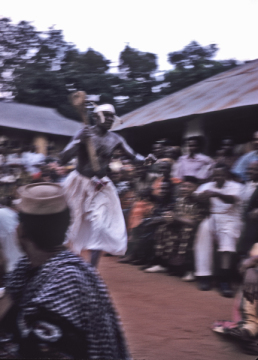 Enwezor: I h i i i i i! (As he cries out, he holds the adze high in his right hand, makes the great bounding strides of the Ngwadu dance down the length of the courtyard, bounds back to the wood, pauses over it, and with a powerful stroke drives the blade deep into the log.)
Enwezor: I h i i i i i! (As he cries out, he holds the adze high in his right hand, makes the great bounding strides of the Ngwadu dance down the length of the courtyard, bounds back to the wood, pauses over it, and with a powerful stroke drives the blade deep into the log.)
Voice: Softly, carefully! (Audience cheers.)
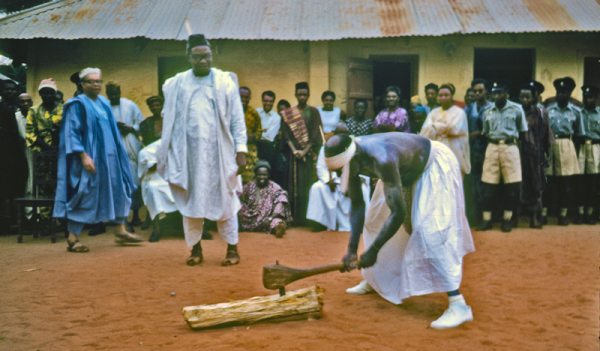 Onowu: Money to pay for the wood! (Barrister Emejulu, standing beside Enwezor in the image above, walks out to the block of wood and places a £1 note atop it.)
Onowu: Money to pay for the wood! (Barrister Emejulu, standing beside Enwezor in the image above, walks out to the block of wood and places a £1 note atop it.)
Onowu: Go and bring the pot of water. Let him go and fetch water for cooking for me at the ukoni (the senior chief’s sacred kitchen). (Enwezor carries the pot around on his head, using a wrapped head ring.) Akpe, help him put the pot down.
Onowu: Bring it, bring the yam for him to peel. Okunwa, please bring him a broom, to sweep the ukoni. Akpe, you can figure how he should sweep the ukoni so it will be good.
(Enwezor takes a broom and meticulously sweeps a tiny portion of the yard.)
Let him pay. (Aside: It is when he pays that he ends. Whatever he does, he must pay for.) (People shout, “Your wealth will grow bigger and bigger!” as Emejulu walks to the broom and places a £1 note on it.)
Onowu: Who has the yam? Bring the yam and the knife.
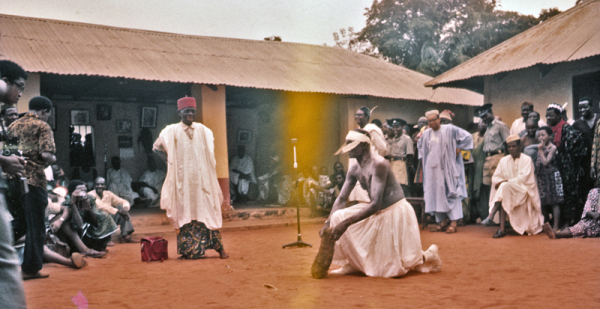 (Enwezor kneels and scrapes off yam bark with the knife, as the Akpe directs him.)
(Enwezor kneels and scrapes off yam bark with the knife, as the Akpe directs him.)
Onowu: Where is the pot?
Voice from audience: Let him finish peeling, first.
(Emejulu places a £1 note atop the yam. The mortar and pestle are brought forth.]
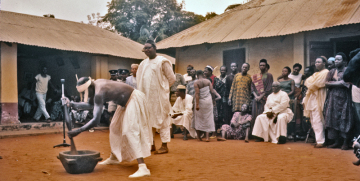 Onowu: Cut out the tail (of the yam), it is the sweet part. It is what you use after all for pounding food. It is the tail that is good for pounding, otherwise it will become lumpy. Bring that mortar, and a small stool. He will pound while standing, so that it will not become cold. (Addressing Enwezor) Put in the yam, Wife, pound it. (Enwezor starts pounding.) Akpe, please tell him not to pound the food too slow, it will become cold.
Onowu: Cut out the tail (of the yam), it is the sweet part. It is what you use after all for pounding food. It is the tail that is good for pounding, otherwise it will become lumpy. Bring that mortar, and a small stool. He will pound while standing, so that it will not become cold. (Addressing Enwezor) Put in the yam, Wife, pound it. (Enwezor starts pounding.) Akpe, please tell him not to pound the food too slow, it will become cold.
Voice from audience: It is enough; it is smooth enough.
Onowu: Let him pay. It is time now for repairing the house. Akpe, what side of the roof will he repair?
Akpe: It is here.
Onowu: Okunwa, come here. It seems that it is this side that leaks.
(The ladder is placed against the corrugated iron roof on the building which houses the Prime Minister’s living quarters. Enwezor climbs the ladder, as ten 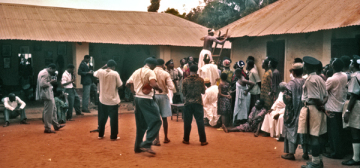 photographers and various bystanders cluster around to get a good view.)
photographers and various bystanders cluster around to get a good view.)
Voice: Give way, so that the photo people will find a chance to snap.
Voice: (Shouts) Hold with your hands; be careful!
(Enwezor makes the motions of repairing a leaking roof.)
(At this time a considerable commotion is aroused as 10 men from the Muslim community of Otu enter the courtyard and an effort is made to provide them with seats. Some of those present show evident exuberance over the appearance of four turbaned chiefs which seems to strengthen the legitimacy of the occasion. These are official representatives of that community.) 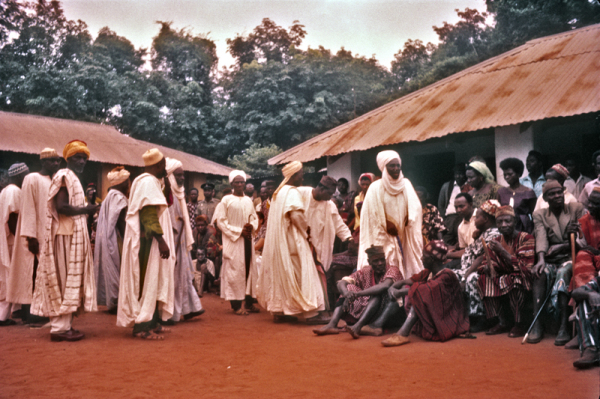 Onowu: He has repaired it.
Onowu: He has repaired it.
(Now the Prime Minister and his chiefs step forward, the chiefs standing on the edge of the Throne Room while the Prime Minister walks to the microphone. Enwezor returns to his chair and sits.
Onowu: (Addressing Enwezor:) Nnanyelugo, please give us chance (attention). Our people, keep quiet. What I am going to tell you, give ears. This is the last task the one who is King of Onitsha will serve. It is the last work the Onitsha King will undertake and complete, and there is no other person’s place where he will undertake it, according to our custom it is only at Onowu‘s place he will do it. Today the service (odibo) will be for the Onowu, as a “servant” to Onowu he has just finished. When I take the keys (ugodu) of the land of the King of Onitsha and give them to him, he will no longer be for chopping wood, he will no longer go to repair houses, he will no more cook nor go on petty errands. Today he is the King, that we shall revere, bow down to. That his how the custom of Onitsha is: it is his final task that he will perform, that he is now doing. Have you heard it?
Audience: Yes!
Onowu: Our people, welcome all!
Audience: Yes!
(Ivory horn blows.)
Onowu: Remove his white cloth. Leave him, he comes to me, I will remove it. This is the word we want to tell you here: everybody may carry it in the ear. When he is going to be crowned, except for police, everybody should remove his hat here. Let no woman wrap any cloth on her head.
Voice: Remove your scarves. People remove your scarves!
Woman: Remove the scarf (from) this child!
Onowu: Don’t make any noise.
(Enwezor kneels before the Prime Minister, his hands clasped behind his back. The Onowu removes the Obi-elect’s white cap and hands it back to the Akpe. He is given a red cap and turns, holding it in both hands, before the kneeling Obi elect.
Onowu:
The crown I am placing on your head today… (an unintelligible phrase) so that we who rule the land of Onitsha, we and you will be ruling in peace, ruling it for the good of men and women; (against) injustice (imegbu) against men and against women. Any person seeking to kill you, let God remove him. It will be that… we shall rule for your good health, and the health of the chiefs standing behind you may last. The life of Onitsha the Nine Clans will last. Our mother’s children who live with us, if white, if red, if blue, we all support that today all living in the land of Onitsha are one body (ofu aru ka abu). Whether you come from Awka, whether you come from Nkpor, or foreigner town (obodo oyibo), human beings have the same body. Let everyone have that in mind, that where you live, there you defend.
Audience: Yes!
Onowu: today, if there is any person who came from Awka today, if he becomes ill, is it not Onitsha that will first know, before an Awka person knows?
Audience: Yes!
Onowu: So it is for everyone here in Onitsha may know it, that he who thinks that he is a person from here, he is a person from there not that one won’t know his name but it is to place before your eyes that today, we are all Onitsha.
Voice from audience: Otherwise, where we are now, strangers will never come in at all.
Onowu: So, all that I am saying now is that after crowning the King, you are not only King for Onitsha Inland Town (enu-onicha) only, you are being crowned the King of all Onitsha.
Our people, all that is being done now will benefit him, will benefit us.
Audience: So be it.
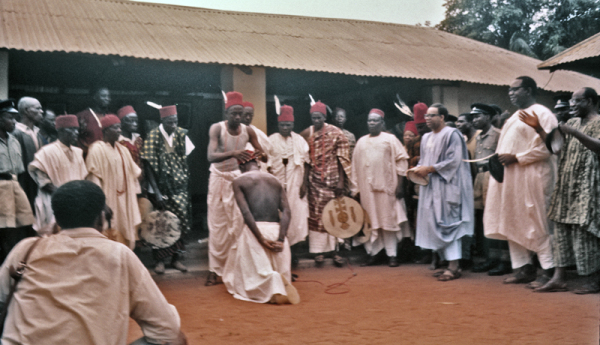 (The Onowu holds the red cap, fingers its tassle, then swiftly but firmly places it on Enwezor’s head. The Onowu then removes his own red cap and, standing before the Obi-elect, gives him the extended right arm salute with closed fist and thumb raised. The other three senior chiefs salute him in the same way, followed by more junior chiefs who bow down to the ground before him. The chiefs from the Muslim community come before him and bow low from the waist. Then several Daughters of Umu-Anyo bow down to the earth.
(The Onowu holds the red cap, fingers its tassle, then swiftly but firmly places it on Enwezor’s head. The Onowu then removes his own red cap and, standing before the Obi-elect, gives him the extended right arm salute with closed fist and thumb raised. The other three senior chiefs salute him in the same way, followed by more junior chiefs who bow down to the ground before him. The chiefs from the Muslim community come before him and bow low from the waist. Then several Daughters of Umu-Anyo bow down to the earth.
Several of his followers raise him onto their shoulders. As the crowd rushes to fill the courtyard, many people saluting him as igwe! “Sky!”, Enwezor raises his right arm high, and calls out to the crowd.)
Enwezor: Greetings to Onitsha!
Audience: (jubilant cheering.)
……………
Note that The Eastern Observer of November 27, 1961 reported that the Onowu said, “Our father, [we] crown you hoping that God will give you sense and wisdom (ezi amamife) to rule this town well; God help you in your ruling”, and that Enwezor replied, “God help me” (chukwu nyelum aka). My tape recorder did not capture this interchange, and I doubt whether it actually occurred. My suspicion is that it was an ex-post-facto press release designed to appeal to the predominantly Christian Eastern Nigeria radio audience (and mainly to the Ndi-Igbo portion of that public).
2. Processions to the palace
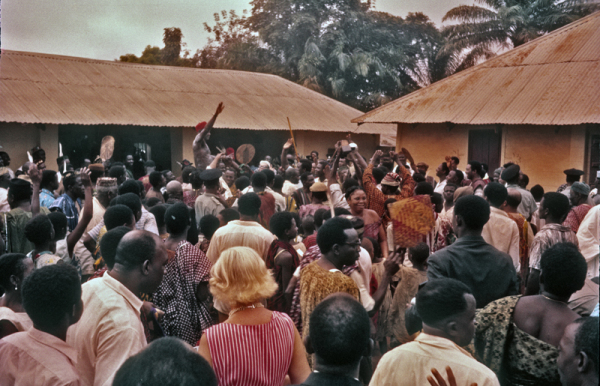 The new Obi is now carried past the throne room and out from the compound and into the roadway, where a crowd of several hundred people mill about.1
The new Obi is now carried past the throne room and out from the compound and into the roadway, where a crowd of several hundred people mill about.1
Placed into the back seat of Emejulu’s new convertible, Obi-elect Enwezor is handed his bronze Ceremonial Sword (abani) and his black horse-tail fly-whisk (otinri), and holds them aloft in each hand as the car drives off in the center of the procession. Instead of the route predicted by John Ochei earlier (which would have taken the Obi uphill into the Inland Town villages of Odoje, Isiokwe, and Ogbe-Oli-Olosi, they pass directly from Umu-Ase into Umu-EzeAroli Quarters and thence past the Sacred Grove of the Kings to the Onya‘s house. As they proceed the car stops repeatedly when women came dancing out from their houses, calling “Igwe“, and Enwezor dispenses white clay powder into their hands, with which they wash their arms and faces.
As the procession turns up St. Stevens Road near the Onya’s house, The car is confronted by a dancing phalanx of The Daughters of Umu-Anyo, dressed in their finest gowns, singing “Whoever wants to do something, (it’s) time he did it” (onye melu ife, oge me ka ome), a standard song at the culmination of title-taking which alludes to the jealousy of competitors. They sing this one phrase repetitively as Enwezor dispenses white clay onto the ground around him.
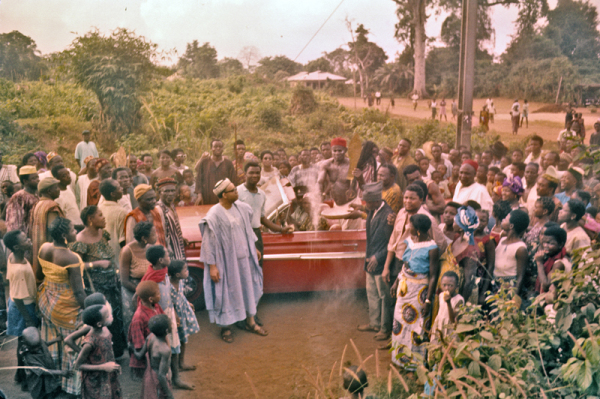 The new Obi is then carried by his followers up into their side of the Sacred Grove of the Kings, where the NBC technicians are stringing wires from their truck into his temporary palace. The supporters carry him around through the accumulating crowd briefly, then take him to the place where a white brahma steer is tethered.
The new Obi is then carried by his followers up into their side of the Sacred Grove of the Kings, where the NBC technicians are stringing wires from their truck into his temporary palace. The supporters carry him around through the accumulating crowd briefly, then take him to the place where a white brahma steer is tethered.
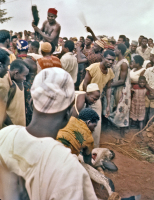 As the photographers snap the scene, Enwezor makes a few strokes on the beast’s neck with his ceremonial sword, and then the same Hausa man who butchered the cow on the previous night completes the slaughter of this animal. After some brief, intense discussion among his followers, Enwezor is abruptly carried away to his house in Umu-Anyo Village, while the NBC workers raced to gather their wires and follow him.
As the photographers snap the scene, Enwezor makes a few strokes on the beast’s neck with his ceremonial sword, and then the same Hausa man who butchered the cow on the previous night completes the slaughter of this animal. After some brief, intense discussion among his followers, Enwezor is abruptly carried away to his house in Umu-Anyo Village, while the NBC workers raced to gather their wires and follow him.
Continuing to wear his red cap, Enwezor is seated in a reclining chair to the right of his throne in the courtyard of his Ancestral House, and men and women approach bareheaded to bow on the 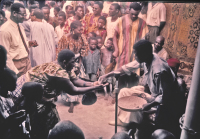
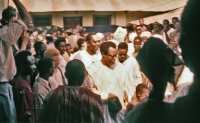 floor in front of him, then to receive white clay for washing their arms and faces. Barrister Emejulu does the bowing with a £1 note on his forehead, and Madame Margaret Obinwe comes forward to accept white clay as representative of the Daughters of Umu-EzeAroli.
floor in front of him, then to receive white clay for washing their arms and faces. Barrister Emejulu does the bowing with a £1 note on his forehead, and Madame Margaret Obinwe comes forward to accept white clay as representative of the Daughters of Umu-EzeAroli.
As I watch the activities, Obiekwe Aniweta speaks to me about how successful the publicity campaign has been, especially the invitation cards sent out to important personalities. Some of the ministers of the Eastern Nigerian Government have already responded with telegrams of congratulation, he tells me. He is also pleased to report that Umera Anazonwu, one of Enwezor’s workers who lives in the house where the late Obi Anazonwu’s royal Ofo objects are kept, has taken hold of them and presented them to Enwezor, thus clearing the last obstacle from Enwezor’s way.
Our discussion is interrupted by a dispute that continues among the new Obi‘s leading supporters concerning an issue just raised at the temporary palace. There is a serious problem of whether or not he should be ritually seated on the throne there. John Ochei as cultural expert points out that according to tradition, once this was done Enwezor can never return to his former, now profane house.
This of course poses serious difficulties, since the temporary palace is but a small, flimsy shed of corrugated metal in which living for any extended period would be undignified, uncomfortable, and very inconvenient. But since the chiefs are already wending their way toward the temporary palace and since the Onowu is insisting on finalizing the installation at this time, the decision is to proceed with that enthronement and then to treat Enwezor’s home throne as a temporary equivalent to the official residence during the time the permanent palace is being built.
So Obi-elect Enwezor is led through the crowds in his chambers out to the waiting car and is driven back to the temporary palace at Okwu-Eze, as the chiefs walk in and take their seats along the sides of the structure, built on a rectangle of about ten by twenty feet. It is framed with vertical two-by-fours about ten feet high, with a gabled roof of corrugated alloy and walls composed of vertical panels of the same corrugate running about six feet high and surmounted by inch gauge screening.
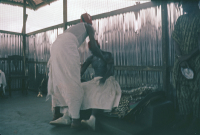 Enwezor then enters, wearing his red cap, and is directed to a chair near the mud bank throne. The Prime Minister rises, addresses a few words to him, then approaches Enwezor, lifts him up from his chair, and forcibly pushes him down to sit on the leopard skin covering his throne. Then Onowu makes the raised-thumb salutation to the new Obi, addressing him with his titles, and is
Enwezor then enters, wearing his red cap, and is directed to a chair near the mud bank throne. The Prime Minister rises, addresses a few words to him, then approaches Enwezor, lifts him up from his chair, and forcibly pushes him down to sit on the leopard skin covering his throne. Then Onowu makes the raised-thumb salutation to the new Obi, addressing him with his titles, and is 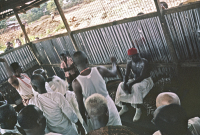 followed by the remaining chiefs. The Muslim chiefs then enter and bow, and with these acts the ceremony ends and Enwezor walks back with his men to Umu-Anyo quarters, passing by the Onya‘s house. As I follow I meet a contingent of about 20 Nsugbe titled men (strikingly distinctive from Ndi-Onicha in their high red caps ringed with rows of small stubbed horns), who are enroute to paying their respects to the new Obi and to present him with a gift.
followed by the remaining chiefs. The Muslim chiefs then enter and bow, and with these acts the ceremony ends and Enwezor walks back with his men to Umu-Anyo quarters, passing by the Onya‘s house. As I follow I meet a contingent of about 20 Nsugbe titled men (strikingly distinctive from Ndi-Onicha in their high red caps ringed with rows of small stubbed horns), who are enroute to paying their respects to the new Obi and to present him with a gift.
I am told that Enwezor has now gone to sleep, and remember that his address to the people (earlier being written by Aniweta) had never been delivered. As far as I am aware, it never was presented verbally, but it appears in both the Spokesman and by the Observer in their issues of November 27 and 28 respectively:
“The Ndichie Ume, Ndichie Okwa, Ndichie Okwaraze, Agbalanze, Onitsha Agbalanairegwu, Ikporo Onitsha and the entire members of the Onitsha Community.
From the bottom of my heart, I thank you very much for the honour done me by conferring on me the high office of the Obi of Onitsha. It is a great honour and I am really very happy for it.
It is a privilege to have in my cabinet some outstanding personalities, whose advice will be of immense benefit not only to me but also to the entire Onitsha community. My Prime Minister, Chief P.O. Anatogu, the Onowu Iyasele of Onitsha, is cool and calculated, and above all has accumulated a wealth of experience both in the Bank of British West Africa and elsewhere.
Chief Isaac Mbanefo M.B.E. the Odu of Onitsha and the first to be installed Ndichie Ume in the cabinet is almost indispensible in solving almost any problem affecting Onitsha nay Eastern Nigeria as a whole. It is a big privilege to have him in my Cabinet. Chief H.V. Orefo, the Owelle of Onitsha, a court clerk for many years and at present the secretary to the Ndichie is a big asset to me.
The Onoli of Onitsha, Chief M.O. Ibeziako at present the leader of Onitsha Bar, will be advising the cabinet in legal and traditional matters. He has written many books on Onitsha native Laws and Customs and eventually can speak with definite certainty on Onitsha history. There are other useful Ndichie like, the Eseagba of Onitsha, the Osuma of Onitsha, the Akwe of Onitsha, and others who have stayed long in the cabinet.
My promise to the entire Onitsha Community is that I will occupy the Throne of Onitsha as a Constitutional Monarch. I will restore peace, good government, and settle all disputes without fear or favour.
Again I will always support the Government in power in the Region but as a national Ruler I will not be active in politics, I am the father of all.
Finally I must be frank to state that I have been committed to the policy of ‘Restoring the Kingdom of Umu eze Aroli,’ which has sunk into oblivion since 1900. The activities of the Onya of Onitsha in this connection are appreciated.
Thanks very much.”
Both newspapers also print accounts of the installation on November 27. While the Spokesman gives a brief factual account, the Observer expresses a wildly enthusiastic one:
“ONITSHA GETS A NEW KING
E N W E Z O R C A P P E D
Thousands Witness Crowning Ceremony
Under a brilliant sunshine, amidst pomp and pageantry, Igwe Nnanyelugo Enwezor, a wealthy contractor of Umu-EzeAroli, Onitsha Inland Town, was yesterday installed the Obi of Onitsha, Ezwezor I, by Chief Philip Anatogu, the traditional Prime Minister of Onitsha.
A large crowd of well over 25,000 people, including Ndichies and Red Cap Chiefs [sic], witnessed the crowning ceremony….”
My own nose count of 350 people inside the Onowu’s compound may have missed as many as 50 heads, and together with those waiting outside the total number of people attracted to the ritual by Enwezor’s invitations (or by other factors) may have been as many as 500. The Observer’s numerical estimate of those in attendance suggests that factual reporting was not a primary intention of their account.
- Note in this photograph the presence of an English woman, the only non-African other than myself attending the ritual. She was the wife of Judge Betuel, presumably attending as a stand-in for the Judge himself, who had been invited by the Igwe. [↩]
